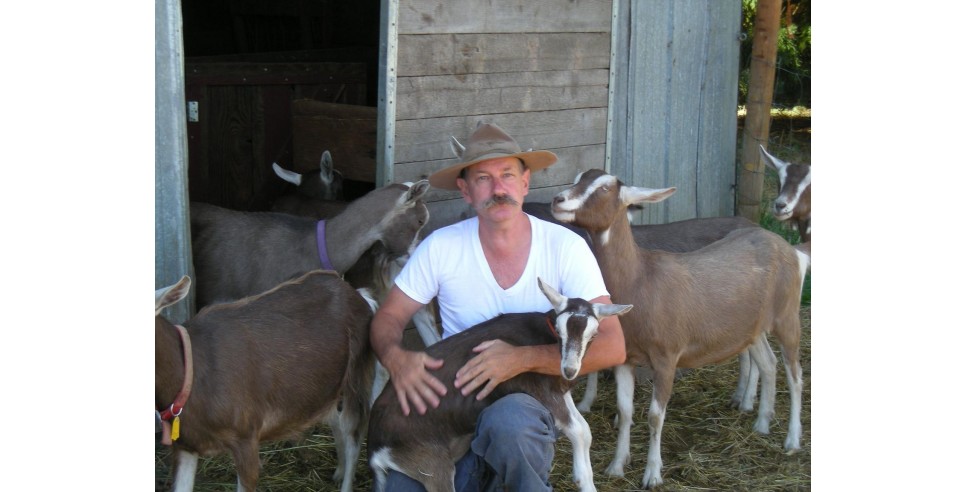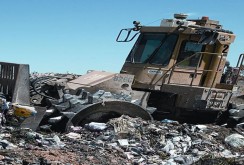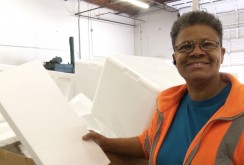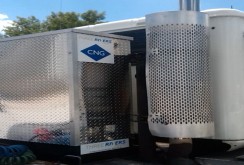
We’ve come a long way in the 35 years since a small, local garbage dump called the Riverbend Landfill was allowed to be built near the banks of the South Yamhill River near McMinnville, Ore. Even then people understood that a pit filled with rotting garbage was going to leak out into the ground and water, especially in this semirural area between Portland and Salem, where it rains a reliable seven or eight months a year.
“The solution to pollution is dilution,” was the mantra in those days — if the dump is going to leach nasty and potentially toxic stuff into the water, put it close to the river, so it can be washed away quickly. In the intervening decades, though, a new understanding has replaced the old one: There is no such place as “away.” The South Yamhill, for instance, flows into the Willamette River, which, in turn, flows into the Columbia. Thousands of people get their drinking and irrigation water downstream from the dump.
Ramsey McPhillips, whose family farm has been on land opposite the landfill since the 1860s, has been engaged in trying to keep Riverbend from expanding for more than two decades and through three owners, including Waste Management Inc. (WMI).
“We were promised that it would not be a menace or get this big,” McPhillips said. “Our family fight has been just to keep the county to its promises of what this landfill would do and who it would serve. It’s become this giant regional landfill that basically supports the [three-county Portland] Metro region.”
Shifting allegiances
Over the past 30 years, several sections of the dump that have been operating since before environmental laws and EPA rules required liners and gas management have leaked substantial amounts of volatile organic compounds into the groundwater between the landfill and the South Yamhill River, according to Riverbend's own data. But that has not convinced WMI, which owns 273 active landfills throughout North America, including this one.
Up until they bought the property, McPhillips said, Waste Management was actually a behind-the-scenes ally.
“Waste Management contacted me, sort of with a towel over the phone, and said, ‘Mr. McPhillips, we’ve been watching you; we want to help you because we want to close Riverbend Landfill, because it’s competition,’” he said. At that time, WMI had been trying to site a major regional waste facility further east, in Gilliam County.
McPhillips claims that Waste Management offered to ghostwrite letters that McPhillips could send to the regulators, arguing for the closing of the Riverbend Landfill as a problem for the community and a danger to the area’s water.
That changed suddenly, according to McPhillips, when Waste Management bought out the competition and came to the opposite conclusion, that Riverbend Landfill was completely safe and an ideal place for Portland and its suburbs to send their trash. To that end, they have expanded the landfill’s capacity repeatedly. Waste Management now wants to add 38 acres of prime farmland next to the current site, allowing it to expand and continue collecting garbage.
Expanding interests
The license to operate Riverbend was originally set to expire this October. In 2008, WMI was denied permission to more than double the size of the landfill. By building a large dirt wall, they have since extended the life of the dump for an additional two years already.
More than 10 million tons of waste now covers what used to be 86 acres of prime farmland in one of the most fertile areas in the United States. Entering Yamhill County, nothing can hide the mountainous mass of
garbage that greets visitors and local folk as they drive down Oregon's busiest tourist road, Highway 18.
Twenty years ago, when many of the decisions that have contributed to the current state of affairs were being made, Yamhill County was small, very rural and one of the more impoverished areas in the state. But it also happens to be one of the best places in the Western Hemisphere to grow pinot noir grapes. As the wine industry grew, so did McMinnville and the adjacent area.
However, because Oregon has some very tough land-use laws, most of McMinnville has not been swallowed up by suburban sprawl, even though the area has become more attractive to city-dwellers looking for a slightly slower pace of life. The result is that the area has grown as a tourist destination.
“The landfill is sitting on the gateway to this up-and-coming, high-end little wine town,” explained IlsaPerse, a local artist and gallery owner, and the leader of the Stop the Dump Coalition, which has been fighting Waste Management for the last eight years.
Bad for business
Perse said the coalition has managed to unite disparate elements of the community, from farmers, to environmentalists moving there from Portland and other urban centers, to the downtown business people. Their interests may not all be identical, but they are aligned together, she said.
Convincing the environmentalists required no heavy lifting at all. Gary Langenwalter, a principal at the Portland Consulting Group and the former pastor of McCabe Chapel United Methodist Church, which overlooks the dumpsite,listed the top five problems that the landfill causes:
1.“From time to time, it stinks to high heaven.”
2.“It leaches into the Yamhill River.”
3.“It leaches into people’s drinking water.”
4.“It’s an eyesore.”
5.“It’s noisy – the noise from the machines running around the top carries up into the valleys.”
“We succeeded because people in Oregon really care about farmland, and the struggle around this landfill has been that they want to cover high-value farmland,” Perse said. “Farmers here are outraged that high-quality farmland with irrigation rights could be covered with garbage. So we were able to convince farmers that if they didn’t step up to the plate and express their outrage, they were going to get walked over.
“The business people understand the implications,” she added. “We’re trying to start a destination area for people to come enjoy the scenery, the food, the beautiful little town, and, if they drive in from the coast, they drive right by a mountain of garbage that is often being worked on with lots of heavy equipment and is often rather smelly.”
Perse admits that some of the old-line businesses that had been in the area for decades were reluctant to join in at first. She said that all changed when the director of the International Pinot Noir Celebration, which brings thousands of wine connoisseurs to the area each summer, threatened to move the event to another area if the odor from the landfill ever interrupted one of their tastings.
“Lo and behold,” said Perse, “the mayor signed a letter written by the city attorney and the city council, saying they were tired of being on the edge of a landfill, and did not see the expansion of a landfill being in the best interest of the economic vitality of the region. That was something we could parlay into getting people to join us. It was safe. We could say, ‘Even the city of McMinnville is against it.’”
“Most people who live in McMinnville think that the landfill is a huge mistake,” said Langenwalter. “But this is the cheapest place for the Portland Metro area [to dispose of their garbage], and Waste Management is now paying, I think, $750,000 a year to Yamhill County for the privilege of causing an environmental disaster. But there’s 100,000 people living in Yamhill County, so it’s only $7.50 per person, per year. If I were to ask the taxpayers, ‘Would you pay $7.50 a year to quit ruining the environment?’ a whole lot of them would say, ‘Yes.’”













